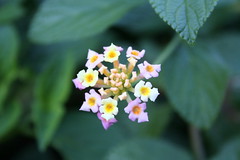
Weed
Originally uploaded by Other Andrew.
One of the terms that crops up all the time in teachings by Lama Zopa Rinpoche is "merely labelled". Every time we receive some sort of stimulus, we apply labels to it. The first label might be "flower" but it might also be "pink" or "pretty", or in this case "weed". This is Lantana, it is both pretty and also a noxious weed in Australia. Without knowing that I would definately have labelled it "pretty", I mean it is pretty, let's face it. It's a 'good' label. Knowing that it strangles out great swathes of native plants though makes me also apply the label 'bad' to it.
We make these judgements and apply these labels all the time don't we? One day the beach is glorious, another day the sun's too hot, the sand's getting in your shoes, I'm going to get sunburned... The beach hasn't changed, so what has? You. Your mind. Your attitude. The way you choose to label it. That's what Rinpoche is trying to make us see, everything around us we have labelled. It's important to challenge those labels, and examine how true they are.

9 comments:
My first reaction too was "my what a pretty rare flower".
One man's flower is another's weed.
For instance,my ancestors imported dandelions to New England as a vital crop with many useful medicinal/food purposes. It remains listed in old garden books as one of man's most useful plants.
Thank you for the reminder to keep a fresh open approach with all things.
Well this parallels the addage 'one man's trash is another's treasure.' Sorta. But I do get the challenge. Our thoughts/reflex impressions are sometimes on auto-pilot without good reason. "Just because" is not good enough. I'm seeing this more and more as I gain understanding with regard to my 'feelings.' How I "feel" about something is entirely up to me. Good post, per usual.
Isn't it interesting that this is as much about neurology as philosophy, I think. Well, a little bit about both, anyway. Labelling and naming are integral to the way our brains operate. When I see "x", I feel "y". Cause and effect stuff that patterns our behavior. But we're bigger than that aren't we? Things and events and people even can only affect us in the ways we allow them to. There is no label inherent, only what we assign. I'm gettin' all Stoic on ur ass now.
It's all a grand illusion anyway. Or should I say Ill-oooh-zhun!? Holla GOB!
this sort of thing always reminds me of learning Ag at school. one of our teachers said - "A weed is just a plant in the wrong place. Even a rose bush is a weed in a wheat field." - which is pretty deep if you extrapolate it.
I define a weed as a plant that is growing where I don't want it to be AND it is determined to stay there.
Labels sweetie?
"Chanel, Dior, Lagerfield, Givenchy, Gaultier, darling, names names names! Harpers, Tatler, English Vogue, American Vogue, French Vogue, Aby-bloody-ssinian bloody Vogue, darling!
I'm chanting as we speak" ..
Actually, if I can be serious for a moment ...
Q. Surely, you can't be serious?
A. I can, and don't call me Shirley
... this kinda reminds me of that famous quote by Frederick Langbridge (1849-1923), "Two men look out through the same bars: One sees the mud and one the stars." Attitude indeed.
wow.you are speaking to me today. well that's how it feels.
the masters wisdom here is just so succinct its breathtaking. thank you a million times for sharing this. labels i suppose are the feelings or attachments you felt/made on seeing/experiencing something - this is so challenging for me not to feel something. a life's work no doubt.
Thanks for the thoughtful comments everyone, I'm glad you got something out of this post. This is such an important issue for me, and its bigger cousin - the stories we tell ourselves about why things happen, why people do what they do, what they are thinking... Its always good to challenge your assumptions, expectations and prejudices, and recognise that a lot of the time we are working on guesswork.
Post a Comment